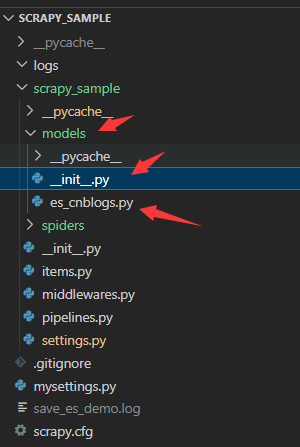Scrapy elasticsearch 使用示例
1.安装elasticsearch-dsl 包
pip3 install elasticsearch-dsl
2.创建scrapy 项目
在项目结构中创建一个models文件夹, 有二个py文件,一个是__init__.py空文件,一个es操作的es_cnblogs.py文件

3. es_cnblogs.py文件代码如下
from datetime import datetime from elasticsearch_dsl import Document, Date, Nested, Boolean, InnerDoc, Completion, Keyword, Text, Integer,query from elasticsearch_dsl import Search from elasticsearch_dsl.connections import connections from mysettings import get_setting index_name="scrapy_cnblogs" client =connections.create_connection(hosts=get_setting("ES_HOST_PORT") ,http_auth=get_setting("ES_HTTP_AUTH")) #创建document实例 cnblogs_search=Search(using=client,index=index_name) #继承了es的Document class CnblogsType(Document): title=Text(analyzer="ik_max_word") author=Keyword() viewcount=Integer() createtime=Date() updatetime=Date() class Index: name=index_name settings = { "number_of_shards": 1, "number_of_replicas":1 } #判断文章是否存在,返回True或False def exist_some_title(self): print(f"exist_some_title:{self.title}") s=cnblogs_search.query("match",title=self.title) #执行count查询,返回数字 https://elasticsearch-dsl.readthedocs.io/en/latest/api.html?highlight=count#elasticsearch_dsl.Search.count count=s.count() #三元表达式,大于0返回True return True if count>0 else False #获取相同title的es源数据 def get_some_title(self): s=cnblogs_search.query("match",title=self.title) #执行搜索并返回Response包装所有数据的实例。 res=s.execute() total = res.hits.total print('total hits', total.relation, total.value) #这里的hits下的hits是es返回的josn格式。可以在kibana中执行scrapy_cnblogs/_search命令查看 hits=res.hits.hits return hits; def mysave(self): if self.exist_some_title()==True: print('更新文章,viewcount会有变化') hits=self.get_some_title() self.meta.id=hits[0]["_id"] print(hits[0]) self.createtime=hits[0]['_source']['createtime'] self.updatetime=datetime.now() self.save() else: print('新增') #如果文档不存在,则创建它,否则将覆盖它。 self.createtime=datetime.now() self.save(); #init 创建索引并填充映射 CnblogsType.init()
其中ES_HOST_PORT 与ES_HTTP_AUTH 是es的数据库连接地址和用户名密码
4.创建scrapy的item数据结构
在items.py文件中,添加一个CnblogsItem的数据类,相当于c#的model类
class CnblogsItem(scrapy.Item): title=scrapy.Field() author=scrapy.Field() viewcount=scrapy.Field()
5.在pipelines.py文件中添加es代码如下
首先导入es_cnblogs.py文件中CnblogsType类
接着创建ElasticSearchPipeline 中间件类,将item(CnblogsItem)数据赋值给esmodel
调用CnblogsType类的mysave()方法将数据保存到es的scrapy_cnblogs索引中
#定义一个item pipeline,CnblogsType继承了es的Document类 from .models.es_cnblogs import CnblogsType class ElasticSearchPipeline: def process_item(self, item, spider): cnblog=CnblogsType() cnblog.title=item['title'] cnblog.author=item['author'] cnblog.viewcount=item['viewcount'] cnblog.mysave() return item
6.创建spider抓取类
将抓取的数据存入CnblogsItem结构中,并返回。 同时使用自定义设置,启用ElasticSearchPipeline中间件
import scrapy from scrapy_sample.items import CnblogsItem #此示例中解析保存到es中,这里使用pipelines方式实现es保存 #1.这里直接返回item #2.在pipelines.py中定义一个类ElasticSearchPipeline,用来保存 #3.在settings.py中启动ITEM_PIPELINES节点,指定该Pipeline用来激活项目管道 class EsDemoSpider(scrapy.Spider): name = 'save_es_demo' allowed_domains = ['cnblogs.com'] start_urls = ['https://www.cnblogs.com/SunSpring/p/16193997.html'] def parse(self, response): #w 代表如果文件已存在就覆盖 item=CnblogsItem() item['title']=response.xpath('//a[@id="cb_post_title_url"]/span/text()').get() item['author']=response.xpath('//a[@id="Header1_HeaderTitle"]/text()').get() item['viewcount']= response.xpath('//span[@id="post_view_count"]/text()').get() yield item custom_settings = { 'LOG_FILE': "save_es_demo.log", 'ITEM_PIPELINES':{'scrapy_sample.pipelines.ElasticSearchPipeline':301} }
elasticsearch-dsl-py源码:https://github.com/elastic/elasticsearch-dsl-py
elasticsearch-dsl-py文档:https://elasticsearch-dsl.readthedocs.io/en/latest/

 浙公网安备 33010602011771号
浙公网安备 33010602011771号